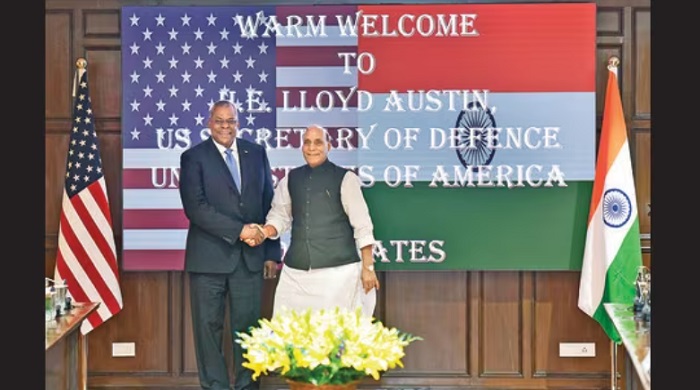
India and the United States on Monday announced the conclusion of a new road map for future defence industrial cooperation with the goal of fast-tracking technology cooperation and co-production in critical areas such as air combat and land mobility systems; intelligence, surveillance, and reconnaissance; munitions, and the undersea domain, in a renewed push for deepening collaboration in the sector during delegation-level talks between defence minister Rajnath Singh and his American counterpart Lloyd J Austin.
In separate statements, the two sides highlighted what the new road map seeks to achieve.
“This initiative aims to change the paradigm for cooperation between US and Indian defense sectors, including a set of specific proposals that could provide India access to cutting-edge technologies and support India’s defense modernization plans,” the US Department of Defense (DoD) said in a statement.
Both sides will identify opportunities for co-development of new technologies and co-production of existing and new systems and facilitate increased collaboration between defence their start-ups, the Indian defence ministry said after the talks.
The talks covered a raft of areas including manufacturing GE-414 fighter jet engines in the country through transfer of technology, buying hi-tech drones from the US for the Indian military, the situation along the Line of Actual Control (LAC) in eastern Ladakh where India has been locked in a border row with China for over three years, and a free and rules-bound Indo-Pacific region where China is pushing for greater influence, Indian officials tracking the dialogue said, asking not to be named.
The deal to build GE-414 engines in India is set to be announced during Prime Minister Narendra Modi’s visit to the US from June 21 to June 24, said one of the officials cited above. The engine will power the light combat aircraft (LCA) Mk-2 and other indigenous fighters that India plans to develop including the advanced medium combat aircraft (AMCA) and the twin-engine deck-based fighter (TEDBF).
“The GE-414 engine deal will be a stepping stone to bring newer technologies to India. The scope for collaboration is immense across critical defence domains,” said one of the officials cited above.
Austin is in India “to reinforce the major defense partnership, and advance cooperation in critical domains” ahead of Modi’s official state visit to Washington, the DoD statement said.
India is also on course to buy Predator drones from the US for the three services, and discussions are on to finalise the numbers needed, the officials said. The possible drone purchase came up during the talks, the officials said. The earlier plan was to buy 30 such drones (10 each for the navy, air force and army) in a deal estimated to be worth $3 billion.
In 2020, the navy leased a pair of MQ-9B SeaGuardian drones (an unarmed variant of the Predators manufactured by General Atomics) from the US to boost its intelligence, surveillance and reconnaissance capabilities. The MQ-9Bs have helped the navy keep a close watch on the Indian Ocean at a time when it has stepped up surveillance in the region to check China’s ambitions.
Removing roadblocks to industrial cooperation was discussed during the talks. The two sides also decided to initiate negotiations on a new arrangement that will enable them to access each other’s industrial resources to address unanticipated supply chain disruptions to meet their security needs. Closer industry-to-industry partnerships and creating resilient supply chains is critical, the Indian officials said.
“The Secretary and Minister Singh also pledged to review regulatory hurdles impeding closer industry-to-industry cooperation and to initiate negotiations on a Security of Supply Arrangement and a Reciprocal Defense Procurement agreement, which will promote long-term supply chain stability,” the DoD statement said.
Austin also held talks with national security advisor Ajit Doval.
“During his meetings, the Secretary and his counterparts exchanged perspectives on a range of regional security issues and committed to collaborating closely with India in support of our shared vision for a free and open Indo-Pacific,” the US statement said.
The two sides agreed that it was key to ensure that countries in the region and the Indo-Pacific retained their freedom of action in line with their national priorities and were not coerced into poor choices, HT has learnt.
The secretary and his counterparts discussed the growing importance of defence innovation and cooperation in emerging domains such as space, cyberspace, and artificial intelligence, the DoD statement said. They praised the recent launch of a new Advanced Domains Defense Dialogue and committed to expanding the scope of bilateral defence cooperation to encompass all domains, while welcoming the establishment of the India-US Defense Acceleration Ecosystem (INDUS-X), a new initiative to advance cutting-edge technology cooperation.
The initiative, which will be launched by the US-India Business Council on June 21, is designed to complement existing government-to-government collaboration by promoting innovative partnerships between US and Indian companies, investors, start-up accelerators, and academic research institutions, the US statement said.
Austin and Singh also committed to strengthening operational collaboration across all military services to support India’s leading role as a security provider in the Indo-Pacific.
“They discussed new opportunities to strengthen information sharing and increase cooperation in the maritime domain. On this note, Secretary Austin welcomed India’s leadership role in the Quad Indo-Pacific Maritime Domain Awareness Initiative (IPMDA), which will provide cutting-edge domain awareness capability to countries across the Indo-Pacific region,” the US statement added.
Both sides reviewed the robust and multifaceted bilateral defence cooperation activities and agreed to maintain the momentum of engagement, the Indian statement said. “They also discussed the regional security issues given their shared interest in maintaining peace and stability in the Indo-Pacific region,” it added. (Hindustan Times)
